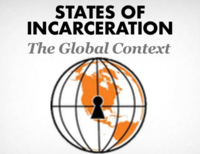Thank you,
—Peter Wagner, Executive Director
Donate
Louisiana profile
Louisiana has an incarceration rate of 1,067 per 100,000 people (including prisons, jails, immigration detention, and juvenile justice facilities), meaning that it locks up a higher percentage of its people than any independent democratic country on earth. Read on to learn more about who is incarcerated in Louisiana and why.
50,000 people from Louisiana are behind bars
Additionally, the number of people impacted by county and city jails in Louisiana is much larger than the graph above would suggest, because people cycle through local jails relatively quickly. Each year, at least 86,000 different people are booked into local jails in Louisiana.
Using a unique dataset, we looked at where people in Louisiana prisons come from. We found they come from all corners of the state, but disproportionately from certain communities.
Rates of imprisonment have grown dramatically in the last 40 years
More than half of the people held in jails in Louisiana are held for federal or state agencies, primarily the state prison system. To avoid counting them twice, this population is not included in the yellow jails line. For annual counts of people in jails held for federal or state authorities in Louisiana, see our table "Jail and prison incarcerated populations by state over time."
Also see these Louisiana graphs:
- total numbers rather than rates.
- Women’s prisons: Incarceration Rates | Total Population
- Men’s prisons: Incarceration Rates | Total Population
This graph excludes people held for state or federal authorities from the total count of people held in Louisiana jails. Because a majority (66%) of the population in Louisiana jails is held for the state prison system, this graph likely overstates the convicted population and understates the pre-trial population.
Today, Louisiana’s incarceration rates stand out internationally

People of color are overrepresented in prisons and jails
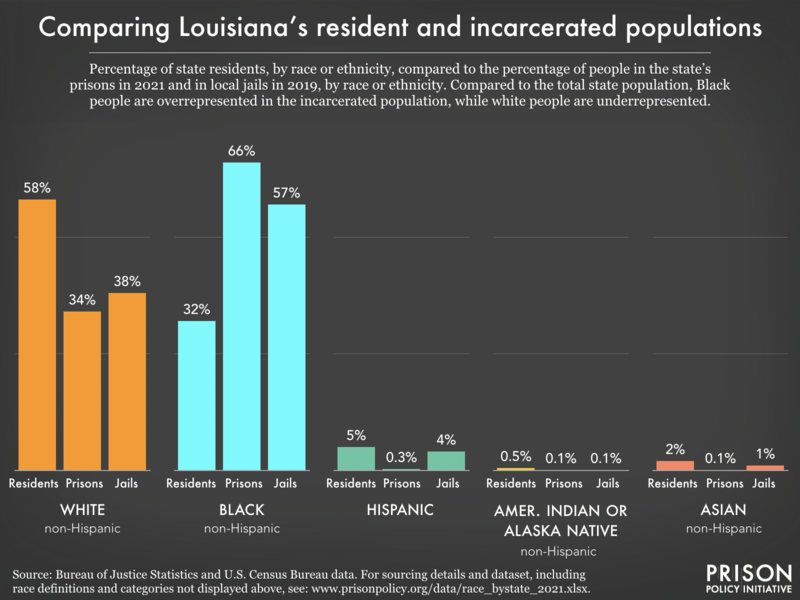
Louisiana's criminal justice system is more than just its prisons and jails
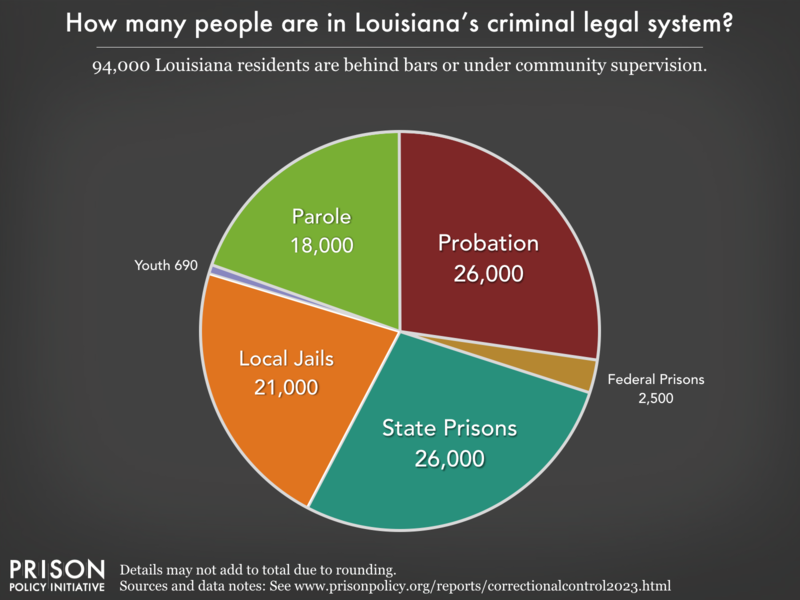
Reports and briefings about Louisiana's criminal legal system:
Filter to show
- People on probation in Louisiana are saddled with onerous rules and conditions they must follow every day or risk incarceration.
- Louisiana lawmakers are eliminating discretionary parole and implementing regressive truth-in-sentencing laws. These policies are set to double the prison population in a state that is already a world leader in incarceration and will harm public safety.
- With an incarceration rate of 1,067 per 100,000 residents, Louisiana locks up a higher percentage of its people than any independent democratic country on earth.
- After the Dobbs’ decision, striking down Roe v. Wade, Louisiana totally banned abortion, putting access to the service effectively out of reach for the 8,330 women on probation or parole in the state who also face travel restrictions.
- 49% of people in Louisiana jails have not been convicted of a crime, meaning they're legally innocent. There are simple steps the state can take to reduce this number. Why isn't it?
- A recent court ruling gives Louisiana the chance to end prison gerrymandering, without waiting until 2030.
- Louisiana releases roughly 212,585 men and 53,693 women from its prisons and jails each year. What is it doing to support them upon reentry?
- Louisiana is one of a handful of states reviving harsh "Truth In Sentencing"-style laws straight out of the '90s
- The parole board in Louisiana is releasing 59% fewer people and holding 52% fewer hearings since the pandemic started
- Black people in Louisiana are incarcerated at a rate 3.5 times higher than white people.
- Louisiana's choice to criminalize "failure to appear" may be hurting public safety
- The cost of incarcerating older people is incredibly high, and their risk of reincarceration is incredibly low, yet 15% of people in Louisiana prisons are over the age of 55. Why is the state keeping so many older people locked up?
- Report:
 Where people in prison come from: The geography of mass incarceration in Louisiana
Where people in prison come from: The geography of mass incarceration in Louisiana - Data from New Orleans, LA and other jurisdictions shows: Releasing people pretrial doesn't harm public safety
- Louisiana makes it difficult or even risky for incarcerated journalists to tell their stories.
- Louisiana has one of nation’s highest rates of HIV in prison as well as some of the most significant racial disparities in the nation, supporting the correlation between HIV and the incarceration of Black people.
- In Louisiana, 50,000 people are incarcerated and another 44,000 are on probation or parole.
- Louisiana charges up to 30¢ for an e-message to or from prison; above the national average.
- Louisiana passed a caregiver mitigation and diversion law that expands the use of sentencing alternatives to incarceration for primary caregivers.
- Jails in Louisiana charge up to $3.15 for a 15-minute phone call, reaping profits for companies, while prisons charge $2.10 for a 15-minute phone call.
- Bail companies in Louisiana have a track record of avoiding accountability, our report All Profit, No Risk and review of state-by-state evidence show
- How the end of Roe v. Wade will impact the 14,395 women on probation and parole in Louisiana
- Some prisons in Louisiana are sited on uninhabitable, toxic wastelands
- Louisiana suspended its $3 medical copays in prisons at the beginning of the pandemic, it should eliminate them completely.
- Louisiana's policy on resources for the poorest people in prisons lacks important information.
- Louisiana prisons charge families up to a 18% fee to transfer money to an incarcerated loved one.
- We gave Louisiana a failing grade in September 2021 for its response to the coronavirus in prisons.
- Louisiana hurts jury diversity by excluding people with felony records
- How many COVID-19 cases in Louisiana communities can be linked to outbreaks in correctional facilities? (data from our report Mass Incarceration, COVID-19, and Community Spread)
- Cruel and unusual punishment: When Louisiana prisons don't provide air conditioning.
- New data: Low incomes — but high fees — for people on probation in Louisiana
- We graded the parole release systems of all 50 states - Louisiana gets an F
- Louisiana incarcerates women at a rate of 163 per 100,000 residents — higher than any democratic country on earth.
- People in Louisiana prisons earn as little as 4¢ an hour for their work.
- Vera finds costs outweigh benefits in Louisiana's “user-funded” criminal justice system
- Louisiana Local Governments' Struggles With Prison-Based Gerrymandering Could Be Eased By State
Other resources
- Research on Louisiana in our Research Library
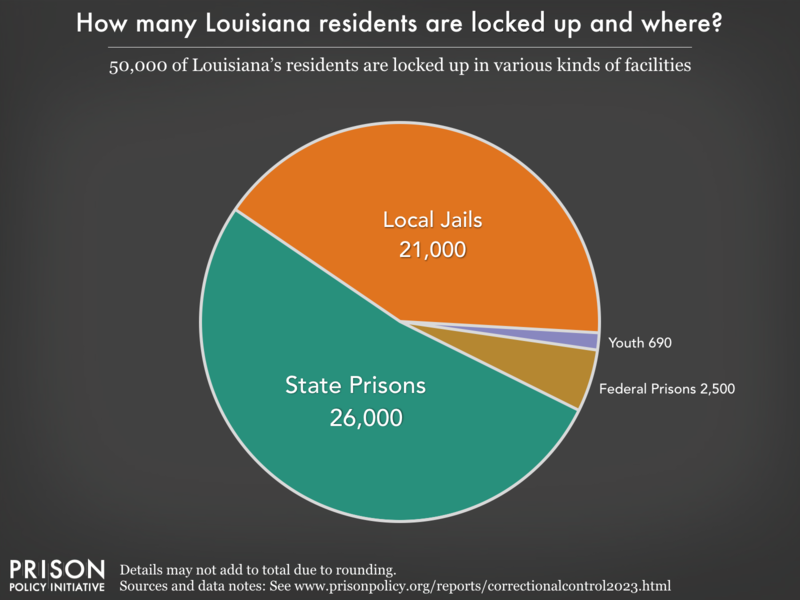
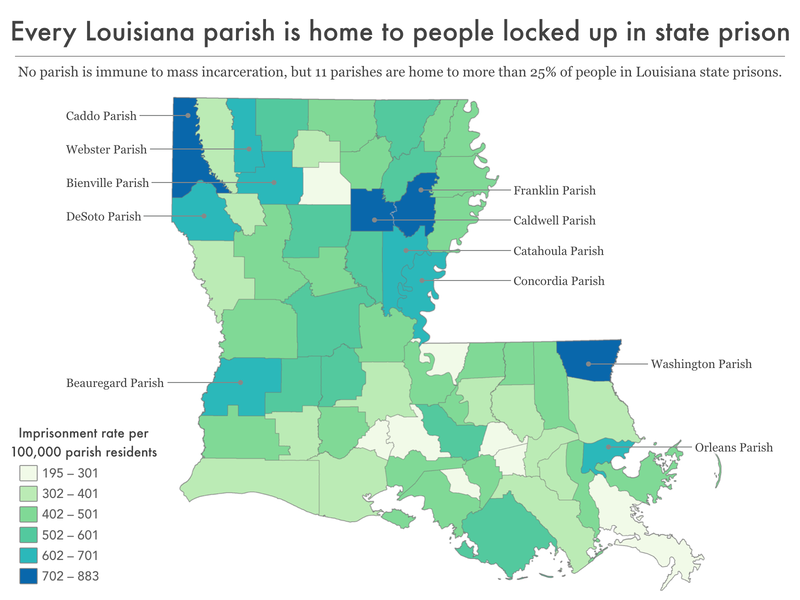
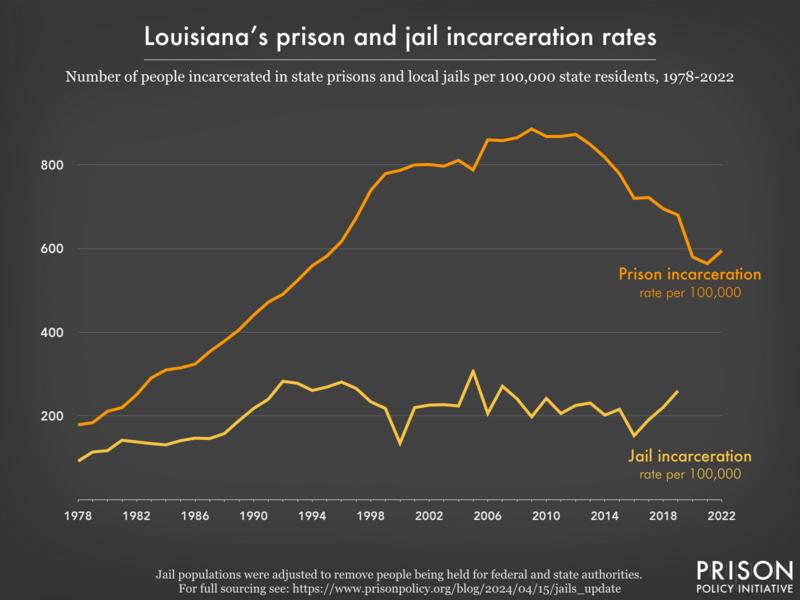
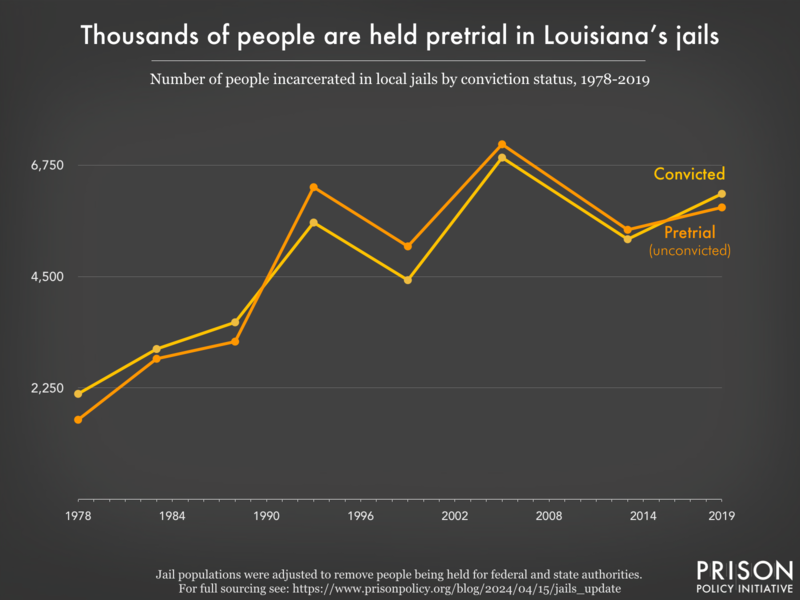
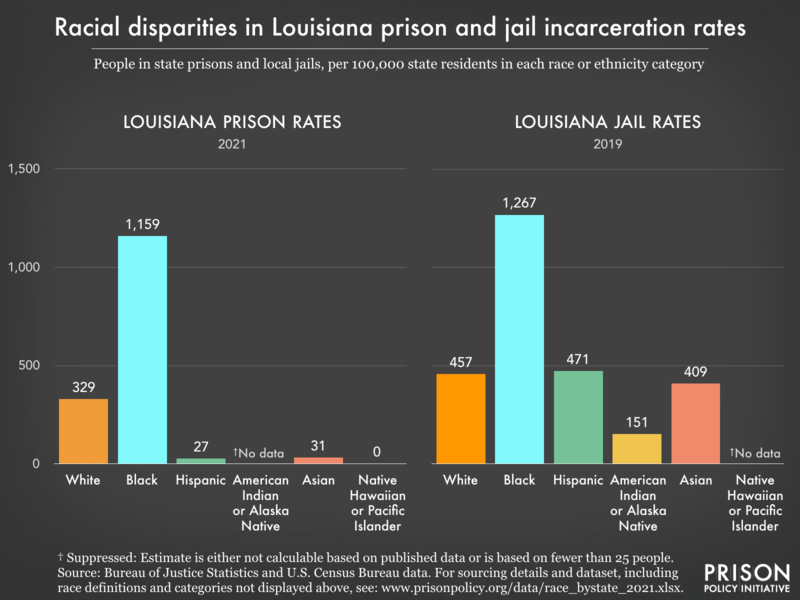
 Where people in prison come from: The geography of mass incarceration in Louisiana
Where people in prison come from: The geography of mass incarceration in Louisiana

